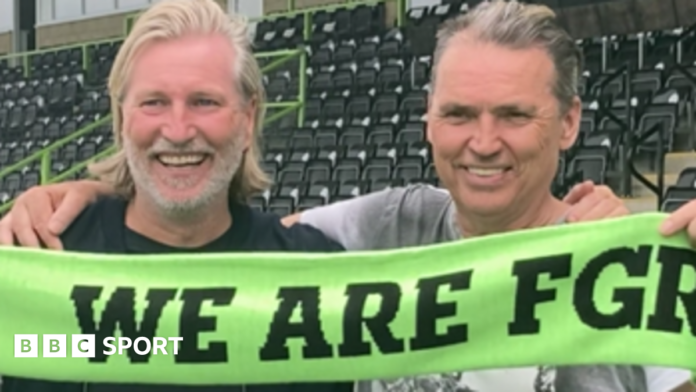“People say I’m a pantomime villain and that I should be able to take the abuse,” says Robbie Savage. “But it does affect me, especially when I’m away from my family, living on my own, and isolated.”
The Forest Green Rovers manager, an often divisive figure in football, is talking about mental health and the “vile abuse” directed towards him from some opposition fans.
A NHS pilot scheme in Gloucestershire allows GPs in the area to prescribe tickets to Forest Green home games to patients with depression.
Savage, who captained four Premier League clubs after being released by Manchester United, is open about his own mental health.
He has spoken in the past about dealing with anxiety and panic attacks,, external as well as the death of his father.
Since taking the full-time job at Forest Green in July, the former Wales midfielder, 51, spends most of the week away from the family home near Manchester, where his wife Sarah, and youngest son Freddie, still live.
“There are times I go back to my apartment and I’m isolated, I’m on my own, and it can be hard,” adds Savage.
“When you’re a player, you can go out with your team-mates. As a manager you can’t go out with your players so it’s quite a lonely place, especially when you’re receiving abuse.”
Earlier this month, Savage says he was subjected to abuse that “crossed the line” during an away game at Carlisle United, with the Cumbrian club saying they will pass on video, audio and CCTV footage to the Football Association.
“One of the things I like most about football is the humour, the banter, the camaraderie. We have it at this football club and I have it with away fans,” says Savage.
“But there is a line. That line was crossed [against Carlisle] and that’s not acceptable. We’re not talking about the every day abuse that football fans give.
“Then there’s a social media pile-on. All the negative energy that surrounds me from other people, it does get to me at times.
“How do I deal with it? It’s hard but the most important thing for me is speaking to people and being around people at the training ground.”
Savage says it is important to address mental health issues and fully supports his club supplying free tickets to patients with mild to moderate depression.
“People do struggle mentally in life,” he adds.
“This initiative is not just about watching football. It’s about the day itself because when you come to a match, you meet new people, friends, engage with family.”

